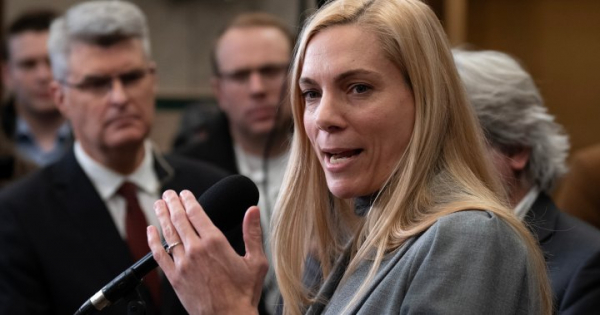"Heritage Minister St-Onge Testifies as Ottawa Secures Deal with Google, Resolving Online News Act Dispute"
In a significant development, Heritage Minister Pascale St-Onge is set to testify at a committee hearing following the resolution of Canada's standoff with Google over the Online News Act. The recently announced agreement, characterized by St-Onge as a "historic development," marks a victory for both the federal government and local news publishers targeted by the legislation.
Despite Google committing to a maximum annual compensation of $100 million for Canadian news outlets – significantly less than the initial government calculations of $172 million – St-Onge deems it a win for all parties involved. The Online News Act, slated to take effect next month, mandates tech giants like Google and Meta to negotiate compensation deals with news publishers for content generating revenue on their platforms. Meta, overseeing Facebook and Instagram, has chosen to block Canadian users' access to news content instead of engaging in negotiations.
The legislation aims to compensate broadcasters, newspapers, French-language, and Indigenous news organizations, with compensation tied to their respective full-time journalist staffing levels. St-Onge emphasized, "We have found a path forward to answer Google’s questions about the process and the act. Canada reserves the right to reopen our regulations if there are better agreements struck elsewhere in the world."
Google's President of Global Affairs, Kent Walker, expressed gratitude for the minister's acknowledgment of concerns and engagement in productive discussions. Immediate changes to existing agreements under Google News Showcase in Canada are anticipated, impacting the company's $1-billion global investment. Google, withholding specifics on current payouts to publishers due to confidentiality, pledged a review of its ongoing investments in Canada upon the publication of final regulations. As St-Onge testifies, the agreement signals a pivotal moment in Canada's approach to regulating online news content and compensation, navigating the delicate balance between technology giants and the traditional media landscape.
"Navigating the Online News Act: Criteria and Companies in Focus"
The Online News Act introduces specific criteria for companies falling under its jurisdiction, targeting those with total global revenue surpassing $1 billion in a calendar year. To be subject to the act's provisions, companies must operate in the search engine or social-media market, facilitating the distribution and access of news content in Canada. Additionally, eligibility extends to entities with 20 million or more Canadian average monthly unique visitors or average monthly active users.
As it stands, the notable contenders meeting these stringent criteria are Google and Meta. These industry giants currently hold a monopoly on the qualifiers set forth by the Online News Act, positioning them as the sole companies currently subject to its regulations. The implications of this criteria not only highlight the scope of influence of the targeted entities but also underscore the government's intention to regulate and ensure fair compensation within the digital news landscape. As the act takes effect, the focus remains on these criteria as a pivotal element in reshaping the dynamics between technology behemoths and the dissemination of news content in Canada.
"As the Online News Act takes center stage, the specific criteria delineating companies within its regulatory ambit serve as a defining feature of this landmark legislation. With a stringent set of requirements – including a global revenue threshold of $1 billion, operation in the search engine or social-media market in Canada, and a substantial Canadian user base – the act has initially cast its regulatory net over industry titans Google and Meta.
The exclusivity of these criteria underscores the government's intent to address the unique challenges posed by dominant players in the digital news landscape. While the current focus is on Google and Meta, the criteria themselves hold the potential to shape the future landscape of digital news regulation, acting as a template for future entrants meeting these substantial thresholds.
As the regulatory landscape evolves and other entities potentially meet the stringent criteria, the Online News Act stands as a dynamic force, ushering in a new era of accountability and compensation in the ever-evolving intersection of technology and journalism in Canada."






